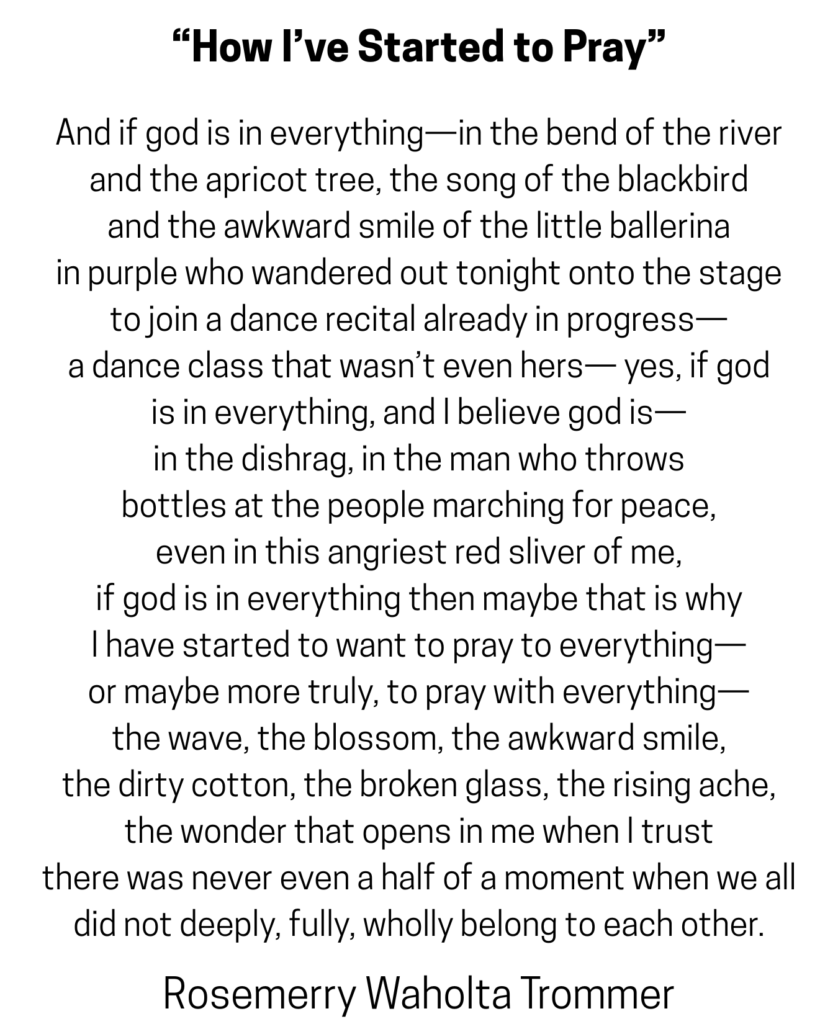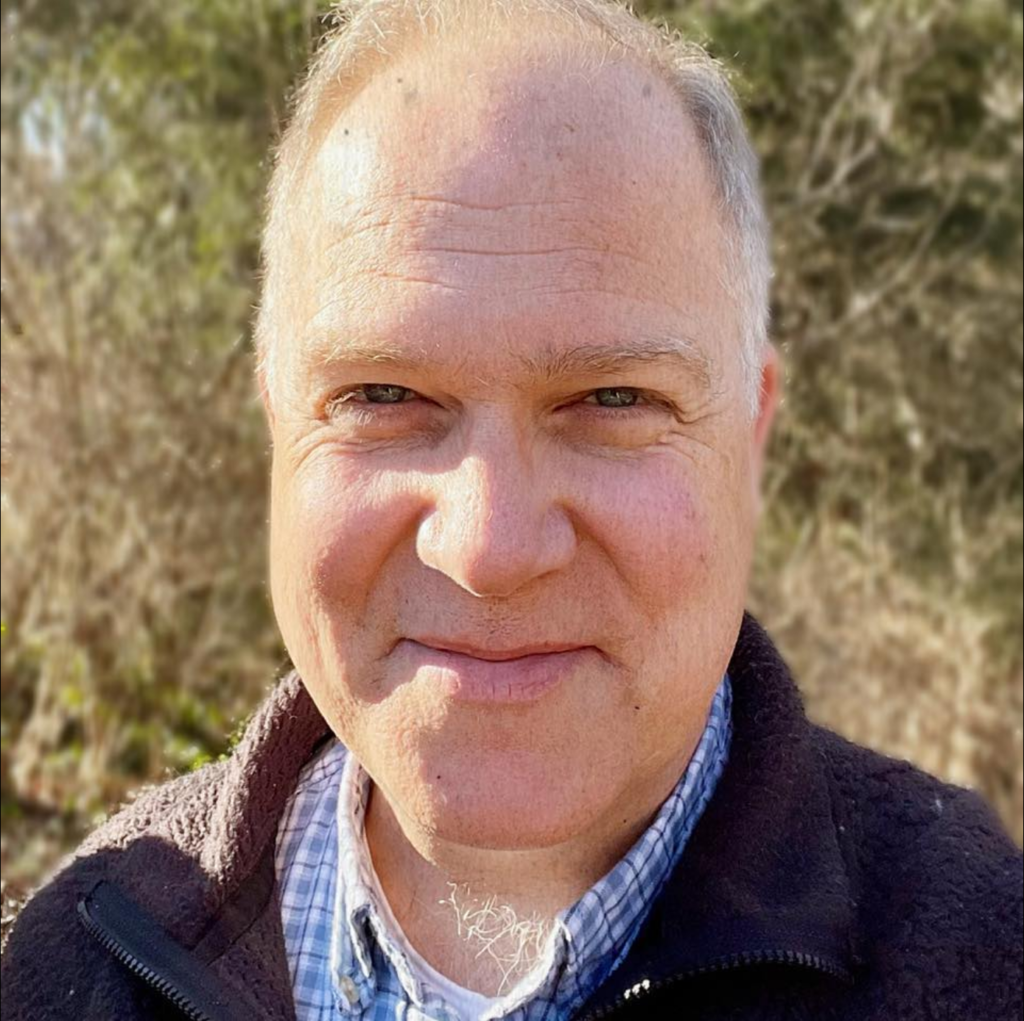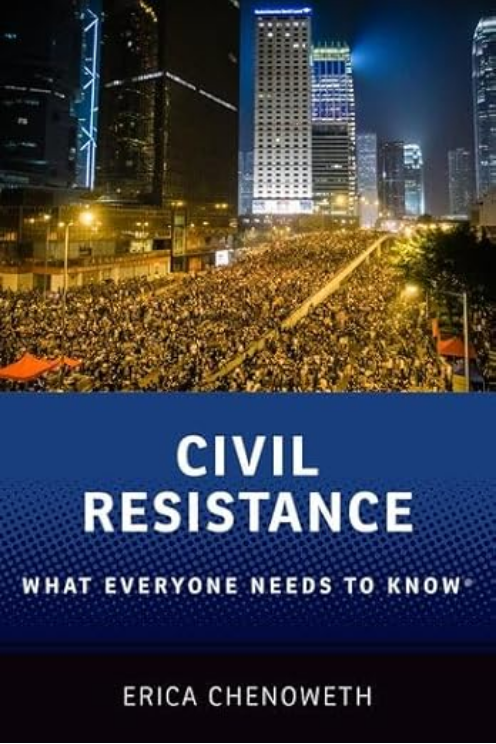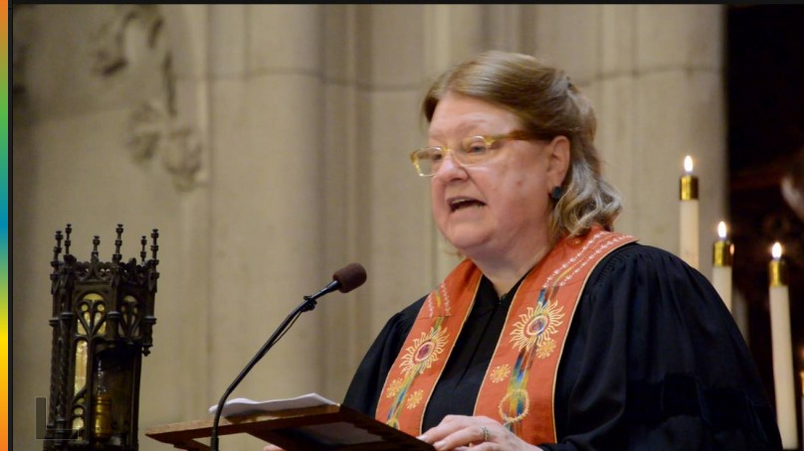April 20, 2025
First Unitarian Universalist Society Burlington
Reverend Karen G. Johnston
We begin with this poem:

This week is a holy time – for some it is Passover; for some it is Holy Week leading up to today’s Easter. And for still others, and perhaps some of the very same people, every week – all the time – is holy time.
I have started to want to pray to everything— or maybe more truly, to pray with everything—
While Christianity, due to its marriage to Empire in the 3rd century, has seeped into secular culture, and while we seem to be in the midst of a culture war in which white Christian nationalism is a cudgel used by authoritarians, I am hoping that given we don’t talk too often about Jesus from this pulpit, we might do so today, using our Unitarian Universalist understanding of this storied figure to find a way into the Unitarian Universalist value of transformation and perhaps even justice.
Now, one of the things that I think is important to realize is that Unitarian Universalists have, historically and currently, viewed Jesus differently than traditional, one might say, orthodox Christian ways. Rooted in our heretical Unitarian heritage, we do not see Jesus as the son of god (and therefore, not part of any trinity). The historic Unitarians didn’t see a trinity – they saw a unity of holiness, a unity of god – that led to that name: unitarian, instead of trinitarian.
We Unitarian Universalists have understood Jesus to be a powerful role model, a teacher – a rabbi who taught a new spin on the values and ethics he learned within his own Jewish community; a radical peace-maker; someone worthy not of worship, but of admiration, and even emulation. Ultimately, a human being. Unitarians did not see any “evidence” that Jesus was divine – except in the context that we are all divine; except in the context that we ~ all of us, each of us ~ carry within us, a divine spark.
Everything. Everything is holy now. (to quote the anthem we just heard)
Everyone. Everyone is holy now.

Now, Christianity is not particularly my jam. Yet, by stint of my profession, I’ve come to be less allergic to it than when I was growing up. I have even developed an appreciation for aspects of this world tradition, a process that was strengthened when, as a class in seminary, I got to spend two weeks in Myanmar, where Christianity is a minority religion. There, I experienced what it could be like if Christianity was not attached to those in power.
So, since Christianity is not my jam, I often lean on friends and colleagues for whom the stories and metaphors and wisdom tales resonate for them. I guess I treat them kind of like spiritual interpreters. For today’s sermon, I reached out to some of my Christian Unitarian Universalist colleagues, seeking their thoughts about how to understand transformation through the life of Jesus. I want to raise up the observations of two of my colleagues, whose thoughts blew my mind.

If you were here last May for my installation as your called minister, you might remember, Rev. Jake Morrill, who preached a fiery message on the Book of Acts. He has been my clergy coach for over 8 years – we don’t have to share the same theology to be able to learn from and with each other. Here’s Jake’s take on the question of Jesus and transformation:
For me, I think the Easter story itself is one of transformation, asking the question, “What does it mean that the human named Jesus was murdered by the state but now lives on, in mystical metaphorical form and memory, held among us in community, as the Body of Christ?”
He continues
For me, it’s the transformation from concentrated/individual to distributed/ collective power as the basis of hope,…
Slay, Jake. Slay.
Let me say that last part again, because it’s not only deep, it’s dense, and I want you to be able to commune with it a bit:

Also important here: “murdered by the state.” Not murdered by the Jews, as so many antisemitic tropes over the ages have been used to rationalize violence against Jews. Murdered by the state. Important for us to remember at this time when the state is disappearing people…


The other observation about Jesus and transformation comes from the Rev. Byron Tyler Coles, who works as a Congregational Life Specialist in the Southern Region of the UUA. He also serves on the steering committee of Black Lives of UU (BLUU) and Diverse and Revolutionary Unitarian Universalist Multicultural Ministries (DRUUMM).
Rev Tyler Coles reflects on the Book of Mark, when Jesus is on the cross, focusing on the Roman Centurion, standing post at the cross. This soldier in the employ of the State goes on to identify Jesus as “Son of God.” Rev. Tyler Coles writes
While read as a theological statement today, scholars say this would have been heard more so as a political statement then, which would have flown in the face of the soldier’s employer – the Emperor. This would demonstrate the solider’s alignment with the ministry of Jesus over and against the mission of the Roman state.
Transformation from loyalty to the tyrant to defection in league with the resistance.



I have been reading a book by Dr. Erica Chenoweth, who is a public policy professor at the Kennedy School at Harvard University. It was during the first Trump administration that I first encountered their work focused on evidence-based understandings of historical resistance movements and their effectiveness in the face of fascism. Their most recent book, Civil Resistance: What Everyone Needs to Know, is a must-read. Though, I have come to learn, it is difficult to find, because the library waitlists are long and all the copies in print have been sold. Still, it is available as an audiobook and an e-book.
In it, Chenoweth references research that names six ways we can measure the success of resistance movements. One of the measures is the increasing numbers of defectors.
Defectors like… Roman Centurions.
I offer these observations to all of us, and most especially to you if Christian scripture is your love language, so that we might think about how our Unitarian Universalist value of Transformation can be enriched through engagement with those texts.
And if Christian scripture isn’t your love language, then I bid you look to Peter Mayer’s song, Holy Now, which our impromptu house band sang so movingly for us. I consider it a modern UU sacred text and one that speaks so poignantly to theological transformation: the shift from believing that only some things (or some people) are holy, to understanding that everything (and everyone) is.


To close out this homily, I offer to you this prayer-poem by my colleague, the great Rev. Dr. Kendyl Gibbons who is retiring this year. What I am about to read was written in 2022, so there are some references that will be dated. Yet, its power to transform the meaning of crucifixion and resurrection is undeniable. It is called, “The Humanist Speaks of Easter.”
There are only two things that we know for sure.
One, they stashed Jesus’s body in a tomb –
temporarily, until they could get a chance to bury it properly –
and, two, when they came back, the tomb was empty.
Make of that what you will.
There are many possible explanations, some more likely than others.
I don’t believe that Jesus came back from the dead.
Neither did Martin, or Malcolm.
Neither did Viola Liuzzo,
or Frozan Safi, the women’s rights activist shot by the Taliban in Afghanistan last November.
Neither will dismembered journalist Jamal Kashogi,
or Aleksei Navalny when he dies in a Russian prison.
Neither will documentary filmmaker Brent Renaud, or photographer Maksim Levin,
both killed by invading armies in Ukraine.
Kevin Strickland and Lamonte McIntyre will not get back the stolen decades of their lives.
I don’t believe that the crucifixion is a story with happy ending,
or that it was a one time event.
It happens over and over as the human journey unfolds.
It happens to us, and to the people we love;
It happens to the righteous, and the innocent.
Crucifixion happens, and it feels like the end of the world, every time.
It feels like nothing could matter any more, ever.
And then…
And then, inevitably and miraculously,
Something happens next.
Something happens. Of course it does.
Because the world hasn’t ended, yet.
It’s not always an empty tomb – how trite would that become?
Mostly, the beloved bodies just lie right there, peacefully decomposing.
But something happens, and whether we want it or not, a new chapter begins.
Maybe the sun comes up, or the lilies do. Spring rolls around. That happens.
Or memories come. Or someone needs you.
You eat food; that happens. You walk down the road, and share a recollection.
Life happens, keeps happening,
The dead don’t rise – but we do.
One day, it happens; you take a breath, and it doesn’t hurt to breathe.
You start to see people again, really see them.
Hope rises. Community rises. You rise. We rise. Life rises.
Not because death isn’t real; crucifixion is not just pretend.
But something else is just as real, maybe even more real.
Something happens next –
That is the other thing we know for sure.
Life rises. Outrage rises. Love rises. Faith rises. Tears rise. Hope rises.
This, I do believe.

May we tend to, respond to, do all that we can to stop the crucifixions that happen over and over, as our prayerful act to cultivate outrage rising, life rising, faith rising, hope rising, transforming crucifixions into resurrections.
May we hold loosely our cynicism, and even our secularism, so that we might catch even the slightest glimpse of the holy everywhere.
May we, as the poet urges us to do, embrace “the wonder that opens in [us] when [we] trust there was never even a half of a moment when we all did not deeply, fully, wholly belong to each other.”

